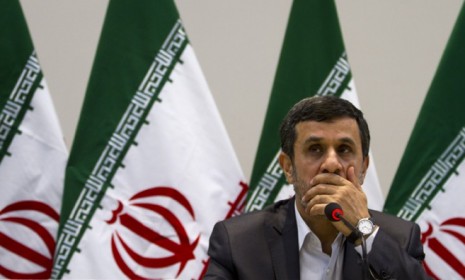Are the West's sanctions pushing Iran too hard?
The economic noose is tightening around Iran, prompting fears that our aggressive approach could spur the regime to lash out in unpredictable ways

A free daily email with the biggest news stories of the day – and the best features from TheWeek.com
You are now subscribed
Your newsletter sign-up was successful
This week, a European boycott of Iranian oil went into effect, part of a larger effort to force Iran to compromise in ongoing negotiations over its suspected nuclear weapons program. The sanctions are expected to dramatically compound the country's economic troubles, since Iran's Shiite regime is heavily dependent on oil for revenue. Previous rounds of tough Western sanctions have caused Tehran's main source of cash to dry up, and, combined with Iran's own economic mismanagement, inflation and unemployment have soared. In addition, the U.S. is bulking up its military presence in the Persian Gulf to block any attempt by Iran to retaliate by closing the Strait of Hormuz, a vital passageway for transporting oil. Taken together, the moves indicate that the West is squeezing Iran to an unprecedented degree — and that has led to warnings that the West could be leaving too little "room for peaceful resolution," says Sen. John Kerry (D-Mass.). Is the West pushing Iran too hard?
Yes. Iran could withdraw from negotiations: "Given the lack of incentives" from the U.S. and its allies, Iran's supreme leader, Ayatollah Khamenei, "might become persuaded that the West only aims at regime change," say Ruth Hanau Santini and Aniseh Bassiri Tabrizi at Italy's Aspen Institute. Facing such an existential threat, the ruling clerics might "stop any pretense of being interested in negotiations," and "accelerate their nuclear program as a deterrent to future international threats." It is in the West's interest to at least keep Iran at the negotiating table, since too much pressure could push Iran toward the end everyone wants to avoid.
"A slow chicken game; Iran and the P5+1 nuclear talks"
The Week
Escape your echo chamber. Get the facts behind the news, plus analysis from multiple perspectives.

Sign up for The Week's Free Newsletters
From our morning news briefing to a weekly Good News Newsletter, get the best of The Week delivered directly to your inbox.
From our morning news briefing to a weekly Good News Newsletter, get the best of The Week delivered directly to your inbox.
No. The Iranian regime is on the verge of collapse: It is difficult to overstate the economic damage the sanctions have done to the Iranian people, says Amotz Asa-El at MarketWatch. Iran is on the cusp of "three-digit hyperinflation," and consumers in Tehran are boycotting shops over the skyrocketing costs of bread and milk. Widespread discontent is "now reaching new populations": Those who didn't join the pro-democracy protests of 2009, but "care greatly for their increasingly threatened income, savings, employment, housing, and dignity." As they watch their money "evaporate between their fingers," they'll turn to new leaders in next year's elections, or sooner. "Change from within is on its way to Iran… whether peacefully or not."
"Iran won't endures West's sanctions"
Actually, the regime might welcome the sanctions: Iran's Shiite rulers "may actually view sanctions not as a cost, but as a benefit," say Hadi Kahalzadeh and John Schlemann at Britain's The Guardian. Iran is not a "rational actor" that responds to increasing economic pressure with concessions. Instead, it sees itself as "the standard bearer of resistance in the Islamic world against what it regards as U.S. imperialism," and views the sanctions as a means to enhance its prestige. "Iran is not playing chess" or any game the West can recognize — and that means a "peaceful resolution in the near future seems very unlikely."
"For Iran, sanctions are a price worth paying to preserve the Islamic republic"
A free daily email with the biggest news stories of the day – and the best features from TheWeek.com